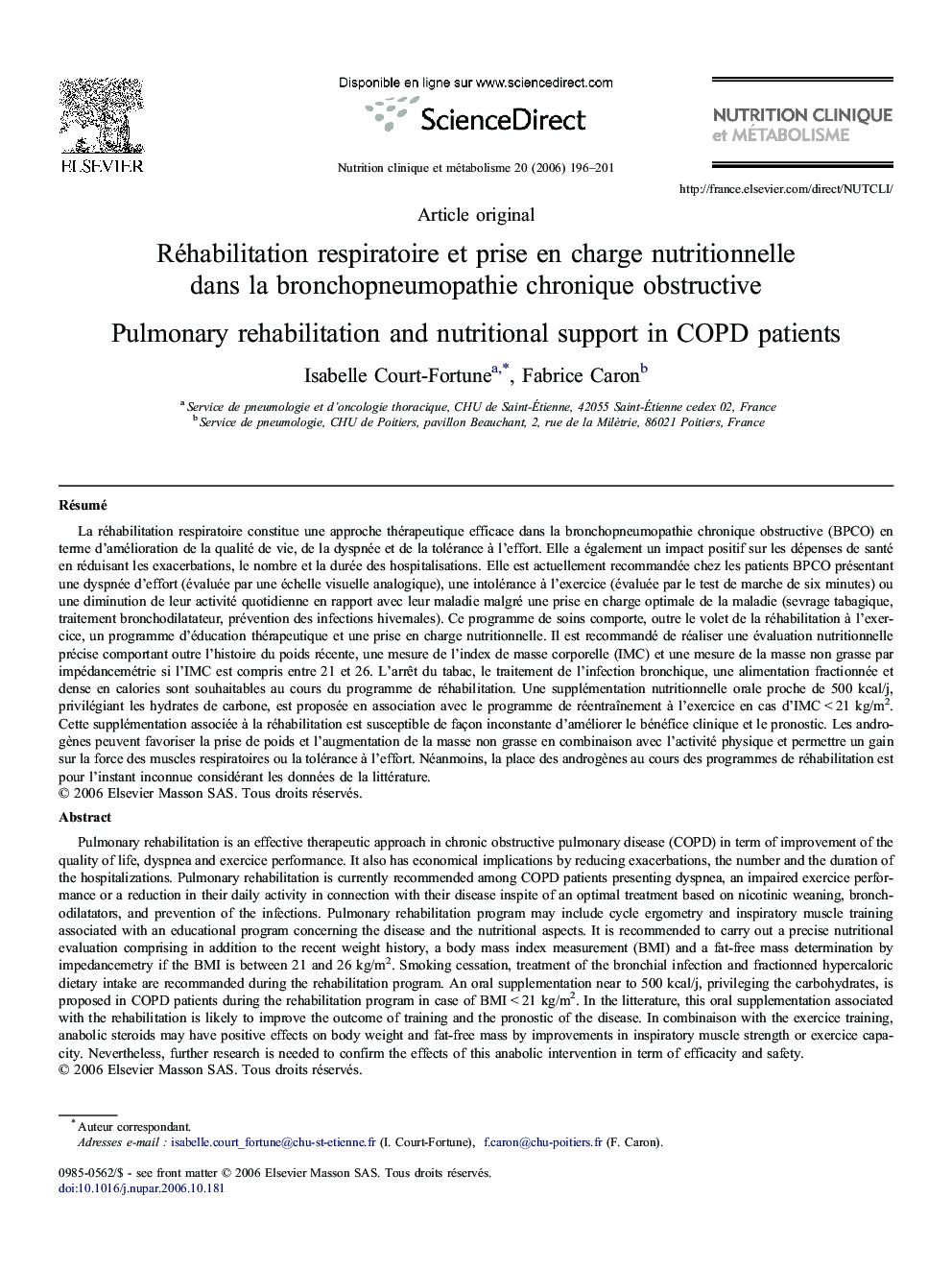| Article ID | Journal | Published Year | Pages | File Type |
|---|---|---|---|---|
| 2693138 | Nutrition Clinique et Métabolisme | 2006 | 6 Pages |
RésuméLa réhabilitation respiratoire constitue une approche thérapeutique efficace dans la bronchopneumopathie chronique obstructive (BPCO) en terme d'amélioration de la qualité de vie, de la dyspnée et de la tolérance à l'effort. Elle a également un impact positif sur les dépenses de santé en réduisant les exacerbations, le nombre et la durée des hospitalisations. Elle est actuellement recommandée chez les patients BPCO présentant une dyspnée d'effort (évaluée par une échelle visuelle analogique), une intolérance à l'exercice (évaluée par le test de marche de six minutes) ou une diminution de leur activité quotidienne en rapport avec leur maladie malgré une prise en charge optimale de la maladie (sevrage tabagique, traitement bronchodilatateur, prévention des infections hivernales). Ce programme de soins comporte, outre le volet de la réhabilitation à l'exercice, un programme d'éducation thérapeutique et une prise en charge nutritionnelle. Il est recommandé de réaliser une évaluation nutritionnelle précise comportant outre l'histoire du poids récente, une mesure de l'index de masse corporelle (IMC) et une mesure de la masse non grasse par impédancemétrie si l'IMC est compris entre 21 et 26. L'arrêt du tabac, le traitement de l'infection bronchique, une alimentation fractionnée et dense en calories sont souhaitables au cours du programme de réhabilitation. Une supplémentation nutritionnelle orale proche de 500 kcal/j, privilégiant les hydrates de carbone, est proposée en association avec le programme de réentraînement à l'exercice en cas d'IMC < 21 kg/m2. Cette supplémentation associée à la réhabilitation est susceptible de façon inconstante d'améliorer le bénéfice clinique et le pronostic. Les androgènes peuvent favoriser la prise de poids et l'augmentation de la masse non grasse en combinaison avec l'activité physique et permettre un gain sur la force des muscles respiratoires ou la tolérance à l'effort. Néanmoins, la place des androgènes au cours des programmes de réhabilitation est pour l'instant inconnue considérant les données de la littérature.
Pulmonary rehabilitation is an effective therapeutic approach in chronic obstructive pulmonary disease (COPD) in term of improvement of the quality of life, dyspnea and exercice performance. It also has economical implications by reducing exacerbations, the number and the duration of the hospitalizations. Pulmonary rehabilitation is currently recommended among COPD patients presenting dyspnea, an impaired exercice performance or a reduction in their daily activity in connection with their disease inspite of an optimal treatment based on nicotinic weaning, bronchodilatators, and prevention of the infections. Pulmonary rehabilitation program may include cycle ergometry and inspiratory muscle training associated with an educational program concerning the disease and the nutritional aspects. It is recommended to carry out a precise nutritional evaluation comprising in addition to the recent weight history, a body mass index measurement (BMI) and a fat-free mass determination by impedancemetry if the BMI is between 21 and 26 kg/m2. Smoking cessation, treatment of the bronchial infection and fractionned hypercaloric dietary intake are recommanded during the rehabilitation program. An oral supplementation near to 500 kcal/j, privileging the carbohydrates, is proposed in COPD patients during the rehabilitation program in case of BMI < 21 kg/m2. In the litterature, this oral supplementation associated with the rehabilitation is likely to improve the outcome of training and the pronostic of the disease. In combinaison with the exercice training, anabolic steroids may have positive effects on body weight and fat-free mass by improvements in inspiratory muscle strength or exercice capacity. Nevertheless, further research is needed to confirm the effects of this anabolic intervention in term of efficacity and safety.
